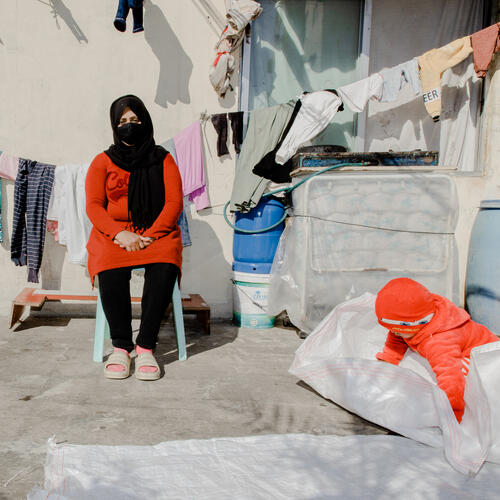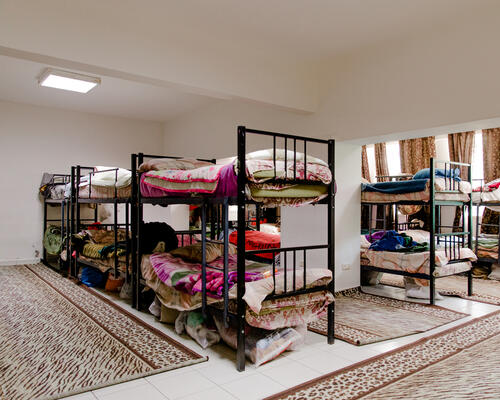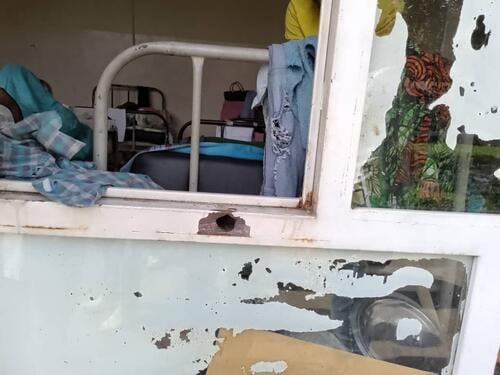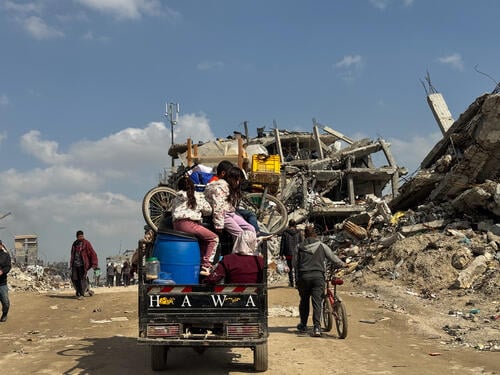Mahi* was forced to sleep on the balcony even during winter. Martha* was sexually harassed — but no one believed her. Beatrice has to answer to another name. Makdes* was subjected to verbal, physical, and psychological abuse. These are just some of the experiences migrant workers have disclosed to Médecins Sans Frontières’ (MSF) medical and mental health teams in Lebanon’s capital, Beirut.
An estimated 176,500 migrants are living in Lebanon1, and about 70 per cent are women. Most emigrated from Asian and African countries, predominantly Ethiopia, Bangladesh, and Sudan. Almost half of the migrants in Lebanon are domestic workers, which means they live with their employers, often in challenging environments.
MSF runs a clinic in Bourj Hammoud, a northern suburb of Beirut that serves as a hub for many vulnerable communities in Lebanon. While the clinic’s services are open to all, the majority of our patients are migrants.

Often people have chosen to leave their home country in search of a better life but find themselves trapped in a system that excludes them from the laws that protect other workers’ rights. It can rob them of their choices, rights, and even their voice.
Migrant workers come to Lebanon through the kafala sponsorship system. Under this system — which at its worst is described by human rights activists and organisations as amounting to “modern-day slavery2” — migrant domestic workers are overworked and underpaid, sometimes not paid at all, and often given no breaks or days off. Our teams have witnessed the serious implications these conditions have on people’s health.
The stories we hear in our clinic intersect in many ways. The sponsor often takes away their employee’s agency as well as their legal documents. Migrant workers who live with their employers are isolated from the world, sometimes denied their right to communicate with anyone outside of the household, including their families back home. If they want to leave, migrant domestic workers can only be matched with another family or allowed to go back to their home countries if the sponsor consents.

Some women who decide to leave their employer’s home find support within the migrant communities, but many are left homeless, without legal documents, and in need of urgent assistance. Should they choose to go back to their country, they might not have the resources for arranging their paperwork or buying a flight ticket. Some choose to stay in Lebanon despite the hardship because they have nowhere to go, or because they need to feed their families.
Migrants’ access to healthcare in Lebanon is severely limited. Under kafala, an employer can obstruct their employee’s right to seek healthcare. Other migrants not bound by kafala are frequently turned away from hospitals and health centres, either for not having legal documents or because they are not Lebanese. Some people avoid seeking hospital care altogether, fearing they will be turned away, deported, or asked for money.
At the MSF clinic in Bourj Hammoud, our teams are responding to migrants’ medical needs, offering basic consultations, sexual and reproductive health services, and mental health services, including psychiatric consultations. We have also been covering the cost of referrals for hospitalisation in life-threatening cases.

“In 2024, psychiatric consultations in the Bourj Hammoud clinic have doubled compared to the previous year,” says Elsa Saikali, MSF mental health supervisor. “Migrant workers are often dehumanised, subjected to racism and discrimination, and exposed to physical and sexual abuse. All this has deep repercussions on their psychological wellbeing.”
Many migrants in Lebanon face a language barrier, further limiting their ability to access healthcare. They are obliged to sign documents and speak in Arabic.
“MSF is one of the rare organisations in Lebanon offering translations to migrants during mental health sessions,” says Elsa Saikali. “What makes our clinic special is the presence of community health educators for patients. They are MSF staff from the migrant communities who facilitate patient bonding, build trust, and make sure the patient is properly informed about their health status”.
Migrant workers are often dehumanised, subjected to racism and discrimination, and exposed to physical and sexual abuse.Elsa Saikali, MSF mental health supervisor.
Migrant communities in Lebanon have needs that span beyond medical care. It is difficult to tell patients to take care of their mental health if they are experiencing homelessness or unable to feed themselves.
“My job is to refer patients to services that are beyond MSF’s ability to respond to,” says Hanan Hamadi, MSF social worker at the Bourj Hammoud clinic. “The patients who come to me have the most basic needs, such as shelter, food items, and cash assistance. I refer them to other organisations offering these services.”
Migrants’ socio-economic situations were exacerbated during the recent Israeli war in Lebanon. Many have disclosed to MSF teams that they were abandoned by their employers, leaving them on the streets or locking them up in their houses in war-affected areas.
During that period, migrant community leaders helped MSF teams reach the migrants most in need of assistance in overcrowded shelters and apartments, where we donated essential relief items and delivered medical care through a mobile clinic.

Programmes for migrants in Lebanon run by local and international organisations have reduced over the years — leaving a gap in resources for migrants.
“It is getting increasingly difficult to refer our patients to other organisations offering assistance to migrants in Lebanon,” says Hanan Hamadi. “This is due to the scarce funding allocated to programmes supporting migrants and the defunding or closure of others. This is not a recent issue, as it’s been happening for a while.”
One of the biggest challenges MSF teams in Lebanon are facing is the referral of patients for hospitalisation, including for psychiatric emergencies. Organisations with scarce funding might stop covering hospitalisation for migrants. Should these organisations scale down their support for hospitalisation, MSF alone cannot cover the gap, and many people’s needs will go unmet.
*Names have been changed.






